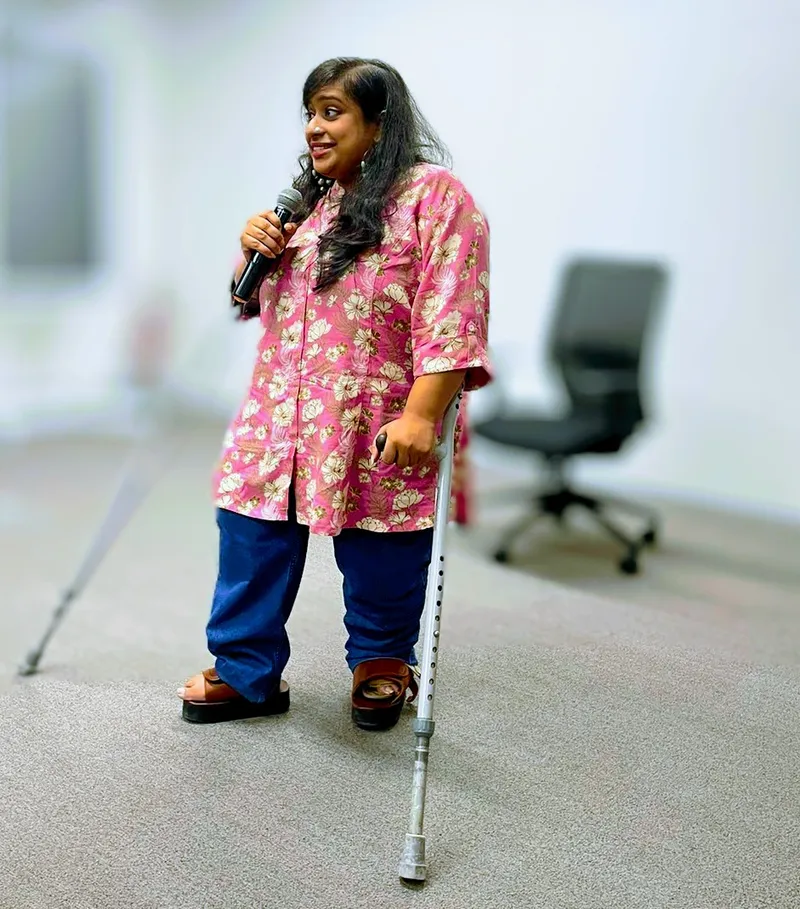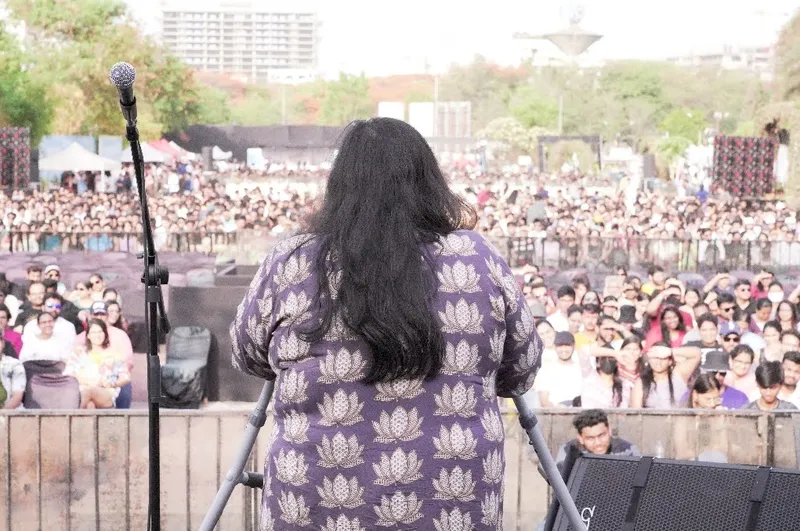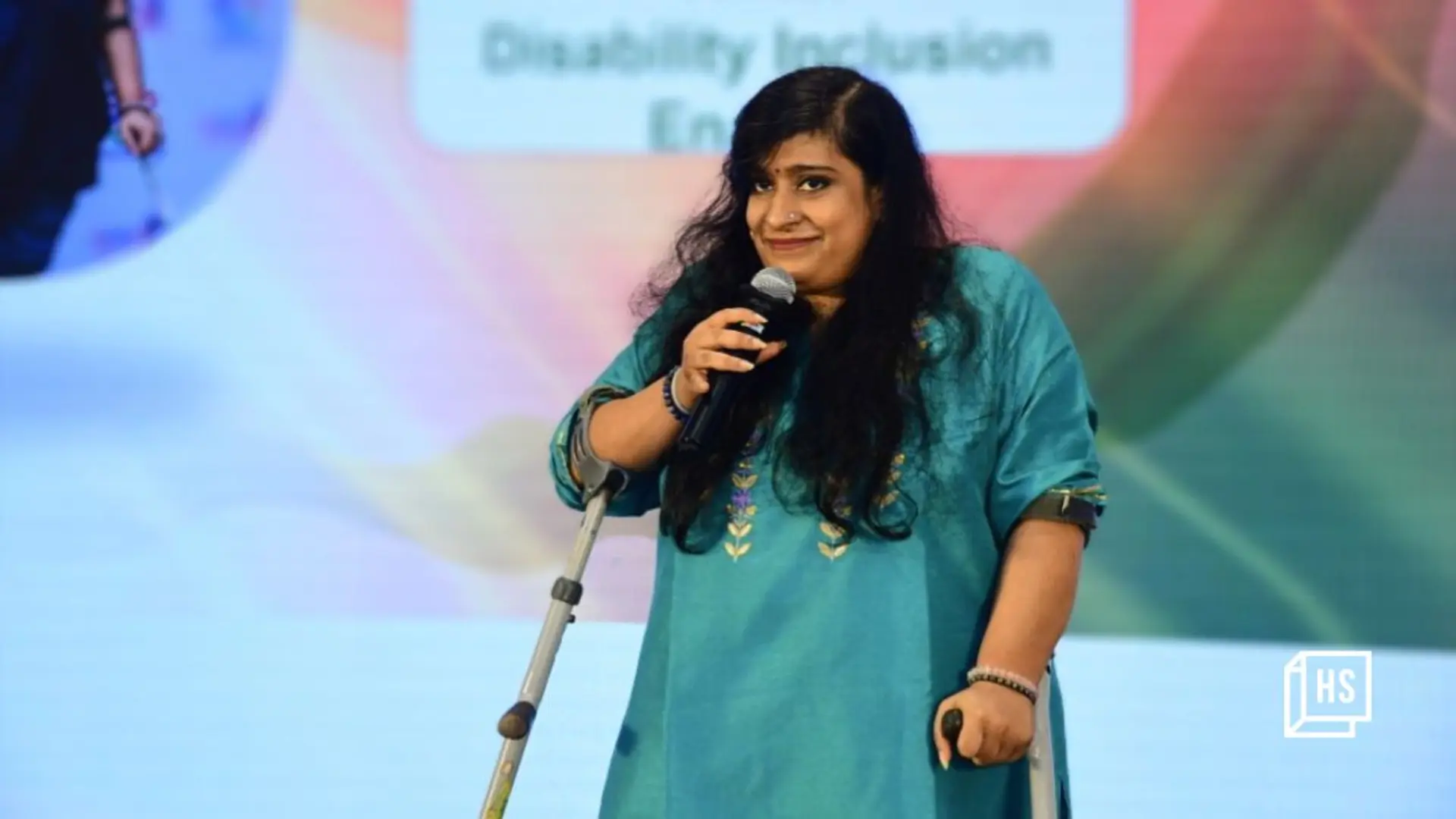This comedian is spreading awareness about disability, one joke at a time
Sweta Mantrii believes that starting the conversation about disability is essential for raising awareness and stresses the need to normalise the needs of people with disabilities.
For Sweta Mantrii, stand-up comedy entered her life unexpectedly.
In 2014, she created a film highlighting the challenges faced by people with disabilities, including inadequate infrastructure among other pressing issues.
However, the content didn't resonate well with the audience, and she faced backlash. People questioned why she was complaining despite having access to resources.
This experience made her realise that there is a “mindset problem” among people around the public perception of disabilities.
After actively working in various disability initiatives, while recovering from a fracture in 2016, she started searching for other ways to advocate for the cause.
Stand-up comedy seemed like the perfect choice of medium to put forward her views.
Her wish to educate people about disabilities and her interest in the art form led her to combine the two.
“In stand-up, the validation from the audience is immediate, unlike working as a writer. For me comedy is not just about raising awareness about disability—it's also about reclaiming my power,” she tells HerStory.
The rebellion

Sweta Mantrii
Mantrii was born with spina bifida—a condition that occurs when the spine and spinal cord don't form properly. Due to the condition, her left leg was not functional, however, with physiotherapy, she now has 25 to 30% movement.
She recalls that till 7 years of age, she was carried to school by her helper, after which she started using crutches and leg braces. Mobility is still an issue; while earlier she could stand for 5 to 7 minutes without the leg braces, now she can stand for one minute.
In addition to the mobility issue, she emphasises that she needs to use the washroom frequently because of the condition.
These challenges are heightened by the lack of proper infrastructure.
Mantrii recalls that in college, she was given an electric wheelchair but there were no ramps in many places, making those areas inaccessible for her.
Even today, the situation has not improved by much. Mantrii says that she has skipped events if the washrooms are not functional or the flooring is not appropriate for her to walk on.
She remembers one such show where a comedy club had slippery glossy-looking flooring. “It was impossible for me to walk on that and even going to the washroom became a big problem. I had to ask for help. This impacted my performance as well,” she says.
Living with a disability requires a lot of planning to go about daily life. She notes that she has to plan well in advance if the venue is on another floor and the place does not have an elevator. When the steps on the stage are too big to climb, she has to perform in front of the stage.
When she was younger, people used to look at her differently, she says.
“People used to say, ‘Bahut bura hua’ ('That’s so unfortunate). Relatives would talk about my future, career, and marriage. All these things were said to me when I was too young to fully understand, but they still left a lasting impact,” she adds.
Her comedy may have begun as a means to an outlet, but Mantrii says she is now learning the nuances of comedy. Now, it’s become an ongoing journey of growth and learning.
She believes that there is a deep-rooted social bias when it comes to disability, with a widespread societal belief that disabled people are not worthy of leading a dignified life.
She continues, “We have the resources to support the lives of disabled people. However, ableism is as deeply rooted in society as patriarchy. Our generation is trying but we are still not there.”
The belief that disabled people do not wish to come out of their houses is also untrue, she says.
“The lack of disabled-friendly infrastructure leads to less visibility of disabled people in society. We need a collective effort to break these physical and psychological barriers,” she adds.
The journey

Even after establishing herself as a stand-up comedian, Mantrii is deeply committed to her advocacy work.
Growing up with two Chartered Accountants parents, Mantrii was exposed to balance sheets and trial balances from a young age. But she knew from early on that becoming a CA wasn't for her.
Instead, she was drawn to music, though she never pursued it professionally. After graduating, she chose to study for an MBA at Symbiosis, Pune.
“I’ve always been good with people, building relationships, and networking,” she adds.
Soon after completing her course, Mantrii joined a PR company based in Mumbai. However, her parents were hesitant about her moving away from home. It wasn’t until her boss personally visited them and reassured them that they agreed to let her go.
Once in Mumbai, however, Mantrii faced significant challenges, especially during the monsoon season. Simple tasks like finding a taxi or even entering her building became difficult in the heavy rains.
Eventually, the challenges became too overwhelming, and she decided to leave her job and return to her hometown, where she started working as a freelance writer and began engaging in advocacy work.
Along with a friend, she worked on a project called ‘Give Some Space’, in which together, they installed ramps on SB Road, Fergusson College Road, and nearby areas in Pune. This was done to make it easier for wheelchair users to access bookstores, restaurants etc.
In 2016, Mantrii asked her comedian friends to write a script for her but they declined, explaining that they would not be able to do justice to the content, especially in regards to the challenges she wanted to address.
Instead, they encouraged her to write her set. Taking their advice, Mantrii wrote and performed her set at an event, where she received a positive response. This pushed her to keep moving ahead.

Sweta Mantrii believes that starting the conversation about disability is essential for raising awareness
While continuing her advocacy work, a year later, she created an art installation called the "Restroom Project" for an exhibition. The artwork featured a map of various locations in Pune, with toilet seats crafted from paper. When visitors lifted the seats, they could view the specific issues associated with each restroom from a disability point of view.
She then gave comedy another shot with an open mic in 2017 and received a lot of love from the audience.
“While I want to educate people about disability I don’t want to do injustice to the art form as well,” she adds.
She acknowledges that there are times when people don’t laugh at her jokes due to the sensitivity of the topics she addresses. However, she says that by learning the nuances of comedy and storytelling, she has learned how to navigate this challenge successfully.
The road to change
Even after establishing herself as a stand-up comedian, Mantrii has remained deeply committed to her advocacy work. She actively participates in various projects and panel discussions on navigating love and sexuality as a person with a disability.
Additionally, Mantrii currently has a concept show titled ‘With This Ability,’ which is an hour of comedy and conversation. Mantrii performs this show for corporate audiences as part of their sensitisation efforts and in public shows.
She believes that talking about disability is the first step to change.
“We first need to talk about disability to spread awareness. The act of a disabled person doing ‘stand-up’, which is somewhat ableist, particularly from a disability-focused perspective, is an act of rebellion for change,” she emphasises.
She also continues to stress the need for normalising the accommodation needs of people with disabilities.
“Why am I expected to use or adapt to things that aren't designed with my needs in mind?” she questions.
Edited by Jyoti Narayan



